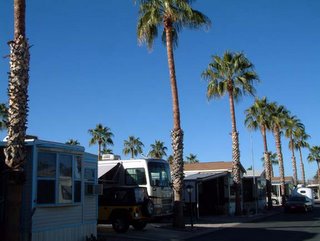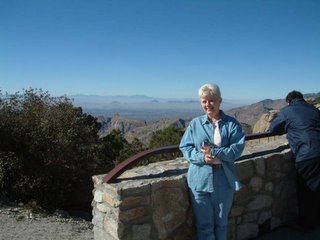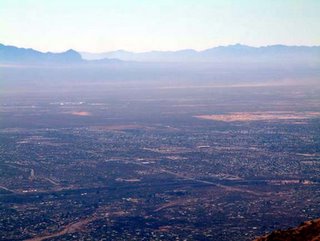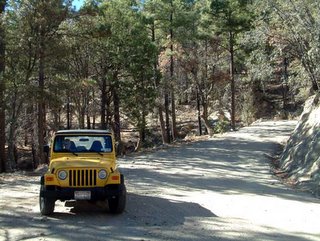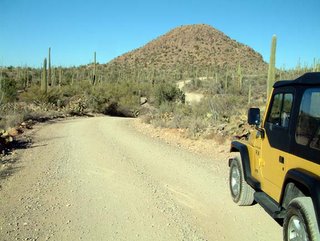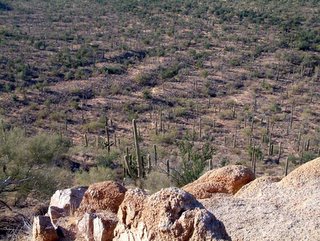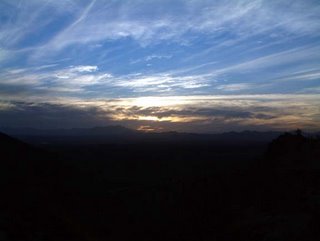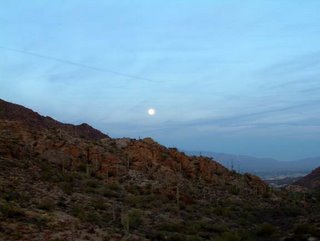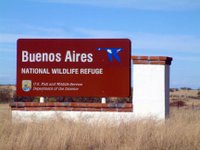 Our visit to Buenos Aries started as a disappointment; driving the washboard dirt 10-mile Pronhorn viewing loop was pretty boring - lots of hills & cactus, but no pronghorn.
Our visit to Buenos Aries started as a disappointment; driving the washboard dirt 10-mile Pronhorn viewing loop was pretty boring - lots of hills & cactus, but no pronghorn. 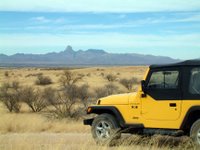 We took a picnic lunch, and because it was a bit cool, decided to pull in to an area under the trees and eat inside the Jeep. While eating, we were visited by a large Bobcat who posed for us while we took pictures. We were amazed that it was out roaming during mid-day; of course, Brenda wanted to take it home. Once I explained that she wouldn't have to worry about it sharing food with her cat, that her cat would be the food, she decided that the bobcat should stay in the wild. It truly was a beautiful animal and made the trip worthwhile.
We took a picnic lunch, and because it was a bit cool, decided to pull in to an area under the trees and eat inside the Jeep. While eating, we were visited by a large Bobcat who posed for us while we took pictures. We were amazed that it was out roaming during mid-day; of course, Brenda wanted to take it home. Once I explained that she wouldn't have to worry about it sharing food with her cat, that her cat would be the food, she decided that the bobcat should stay in the wild. It truly was a beautiful animal and made the trip worthwhile.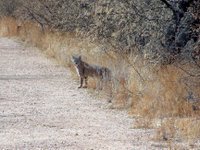 Afterward, we chatted with the administrator and learned that they have an RV area for volunteers. We may decide to volunteer here next winter if we return to the area. From there we drove to the small and remote town of Arivaca. It's kind of a quaint little conclave of people with one store and a few places to eat; one of those places where sniffing the night air might make you start to see things and feel really good. From there it was 12 miles of bad dirt to Arivaca lake, a small (40) acre lake in the foothills. Remarkably (to me), nothing has changed, except that the water level is a bit lower due to the ongoing drought. After a brief walk around the area, it was off to Pena Blanca lake. The drive took us through some of the most beautiful canyons and grasslands we've seen.
Afterward, we chatted with the administrator and learned that they have an RV area for volunteers. We may decide to volunteer here next winter if we return to the area. From there we drove to the small and remote town of Arivaca. It's kind of a quaint little conclave of people with one store and a few places to eat; one of those places where sniffing the night air might make you start to see things and feel really good. From there it was 12 miles of bad dirt to Arivaca lake, a small (40) acre lake in the foothills. Remarkably (to me), nothing has changed, except that the water level is a bit lower due to the ongoing drought. After a brief walk around the area, it was off to Pena Blanca lake. The drive took us through some of the most beautiful canyons and grasslands we've seen. 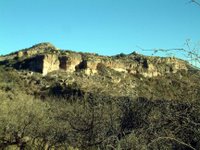
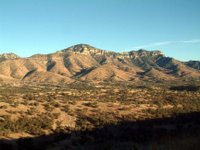 Arriving at the lake, I was surprised to find that the motel, bait store, and boat rental concessions that I'd remembered had all disappeared, an attempt by the state to return the area to a more natural state. The daylight was fading, so we headed east to connect with I-19 just north of Nogales, AZ. Getting to the freeway, we were amazed at the miles of truck depots along the interstate, apparently a result of NAFTA. After a quick stop by the Border Patrol to make sure we weren't smuggling any illegals (or bobcats), we headed home.
Arriving at the lake, I was surprised to find that the motel, bait store, and boat rental concessions that I'd remembered had all disappeared, an attempt by the state to return the area to a more natural state. The daylight was fading, so we headed east to connect with I-19 just north of Nogales, AZ. Getting to the freeway, we were amazed at the miles of truck depots along the interstate, apparently a result of NAFTA. After a quick stop by the Border Patrol to make sure we weren't smuggling any illegals (or bobcats), we headed home.Our next trip was to one of our favorite areas, Sabino Canyon, unique in that it is so close to the urban area of Tucson yet so remotely beautiful. In the 70s, we would drive to well into the canyon, but now you must walk (3.5 miles) or take a shuttle. We decided to compromise by taking the shuttle and walking out, since it would be mostly downhill. All along the road were large red signs warning of mountain lions and steps to take if approached by one. I explained to Brenda that we only had to run faster that the slowest person around, and there were a lot of senior citizens so we should be OK. We had a great day and once again marveled at the beauty of the canyon.
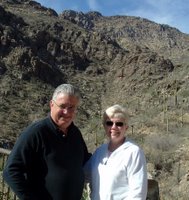
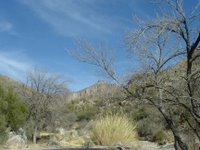
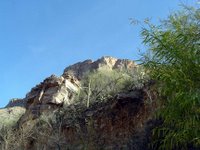 For all our friends back in the midwest, wish you could be here enjoying the weather and the scenery with us. And for all the weather professionals back in Dayton, this is the place to be - every day's forecast is the same, just add one degree of warmth through August.
For all our friends back in the midwest, wish you could be here enjoying the weather and the scenery with us. And for all the weather professionals back in Dayton, this is the place to be - every day's forecast is the same, just add one degree of warmth through August.
